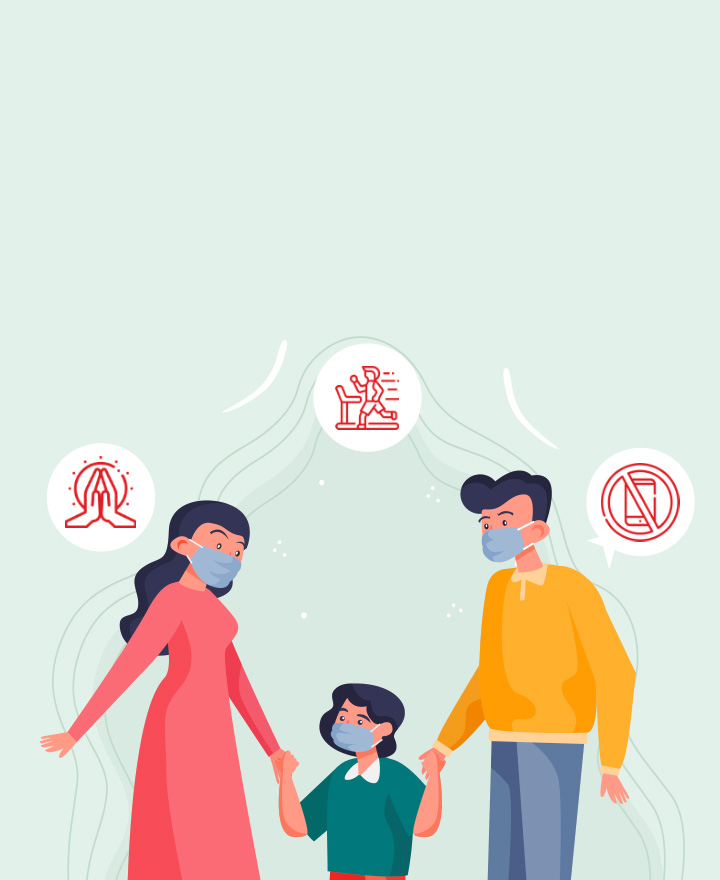

What is Separation Anxiety Disorder ?
Separation anxiety disorder is an extreme fear of being separated from a loved one or primary caregiver. It's much more intense and not developmentally appropriate. Experiencing separation anxiety is a regular part of a child's development, but it becomes a disorder when the anxiety interferes with age-appropriate behavior.
It commonly occurs in babies between 8 and 12 months old, and usually disappears around age 2. However, it can also occur in adults. Read on to know more.
Difference Between Separation Anxiety in Children and Adults ?
Separation anxiety is a common anxiety disorder that can affect children and adults.
One of the main differences between separation anxiety disorder in children and adults is the type of loved one involved. Children are usually anxious when separated from their parents or other trusted caregivers, whereas adults experience anxiety when separated from their children. They also can feel separation anxiety in relationships, such as with a spouse or significant other.
In case of babies, separation anxiety usually starts at about 8 months as at this age, babies often become scared when they see new people. But by age 2, toddlers begin to understand that their parents will return.
Symptoms in Children
Separation anxiety disorder in children often starts in preschool where the child may refuse to leave their parents. Other signs of can include:
• Fear that something bad will happen to a family member during separation.
• Fear of being abducted or getting lost.
• Following caregiver around the house.
• Fear of being left alone.
• Nightmares.
• Bedwetting (nocturnal enuresis).
Symptoms in Adults
Some symptoms of separation anxiety in adults are the same as separation anxiety in children. These symptoms include:
• Fear that something bad will happen to a family member during separation.
• Fear of being abducted.
• Following loved ones around the house.
• Fear of being left alone.
Other Symptoms include:
• Panic attacks when you can’t reach loved ones
• Fear that you or a loved one will get injured during separation
• Social withdrawal
• Difficulty concentrating
Physical Symptoms
The physical symptoms of separation anxiety in children and adults include:
• Stomach aches.
• Headaches.
• Dizziness.
• Nausea and vomiting.
• Diarrhea.
• Chest pain.
• Trouble breathing.
Treatment in Children
Separation anxiety disorder can be treated with cognitive behavioral therapy (CBT) which teaches children how to understand and manage their fears. CBT is used during separations to help children learn coping skills. These skills can be used when a child is feeling anxious.
Doctor may prescribe medications if separation anxiety disorder in your child is severe.
Treatment in Adults
Your healthcare provider may recommend CBT or another type of therapy. Other therapy options include:
• Dialectical behavioral therapy (DBT), a type of therapy that helps you deal with difficult emotions.
• Family therapy.
• Group therapy.
• Medications also may be prescribed.
Conclusion
Long-term separation anxiety, or SAD, can make things difficult for you and your loved ones. This uncomfortable emotional state can prevent you from functioning optimally at work and in social situations. SAD can also cause many physical and emotional issues and affect the overall quality of life. Therefore, if staying away from a loved one has been affecting your emotional well-being for long, get professional help at the earliest for necessary therapy and medication.
One of the important components of our overall wellness is also being financially secured. Healthcare emergencies can happen any time, but a good health insurance policy can protect you from such uncertain situations. To know more about Wellness and other health related tips, visit the Wellness Corner.
Source: my.clevelandclinic, mayoclinic, medicalnewstoday
Disclaimer: This blog provides general information and discussions about health and related subjects. The information and other content provided in this blog, website or in any linked materials are not intended and should not be considered, or used as a substitute for, medical advice, diagnosis or treatment. Kindly contact your Doctor before starting a new medicine or health regime.
Related Articles
Generalized Anxiety Disorder - Unravelling Its Root Causes
Types of Social Anxiety Disorder and Their Impact
5 Safe Remedies To Cure Anxiety Without Medication
Know the Difference Between OCD and Generalized Anxiety
Know How Meditation Helps Resolve Anxiety Disorders
Published on November 03, 2023














 Health Insurance
Health Insurance  Travel Insurance
Travel Insurance  Car Insurance
Car Insurance  Cyber Insurance
Cyber Insurance  Critical Illness Insurance
Critical Illness Insurance
 Pet Insurance
Pet Insurance
 Bike/Two Wheeler Insurance
Bike/Two Wheeler Insurance  Home Insurance
Home Insurance  Third Party Vehicle Ins.
Third Party Vehicle Ins.  Tractor Insurance
Tractor Insurance  Goods Carrying Vehicle Ins.
Goods Carrying Vehicle Ins.  Passenger Carrying Vehicle Ins.
Passenger Carrying Vehicle Ins.  Compulsory Personal Accident Insurance
Compulsory Personal Accident Insurance  Travel Insurance
Travel Insurance  Rural
Rural